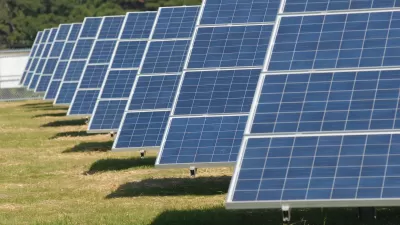A new study by the Reason Foundation evaluates wind power and finds that wind power is limited in practice due to the increased need for power storage, the decrease in grid reliability, and the increased operating costs.
"Environmentalists advocate wind power as one of the main alternatives to fossil fuels, claiming that it is both cost effective and low in carbon emissions. This study seeks to evaluate these claims," according to the Reason Foundation study authors William J. Korchinski and Julian Morris.
The report concludes, "The analysis presented here demonstrates that there is a tradeoff. At low wind penetrations, there is very little impact on CO2 emissions. As wind penetrations increase, the grid requires increasing amounts of spinning reserves to maintain reliability. At high wind penetrations, even large amounts of power storage cannot prevent significant (and expensive) wind dumping. The already high cost of wind power increases with the construction of storage facilities, and the cost to construct extra wind turbines, which will be dormant during periods of wind dumping."
The full report, "The Limits of Wind Power" (PDF, 2MB) is also available.
FULL STORY: The Limits of Wind Power

Alabama: Trump Terminates Settlements for Black Communities Harmed By Raw Sewage
Trump deemed the landmark civil rights agreement “illegal DEI and environmental justice policy.”

Study: Maui’s Plan to Convert Vacation Rentals to Long-Term Housing Could Cause Nearly $1 Billion Economic Loss
The plan would reduce visitor accommodation by 25% resulting in 1,900 jobs lost.

Planetizen Federal Action Tracker
A weekly monitor of how Trump’s orders and actions are impacting planners and planning in America.

Parklet Symposium Highlights the Success of Shared Spaces
Parklets got a boost during the Covid-19 pandemic, when the concept was translated to outdoor dining programs that offered restaurants a lifeline during the shutdown.

Federal Homelessness Agency Places Entire Staff on Leave
The U.S. Interagency Council on Homelessness is the only federal agency dedicated to preventing and ending homelessness.

Restoring Northern India’s Himalayan ‘Water Temples’
Thousands of centuries-old buildings protect the region’s natural springs and serve as community wells and gathering places.
Urban Design for Planners 1: Software Tools
This six-course series explores essential urban design concepts using open source software and equips planners with the tools they need to participate fully in the urban design process.
Planning for Universal Design
Learn the tools for implementing Universal Design in planning regulations.
Caltrans
Smith Gee Studio
Institute for Housing and Urban Development Studies (IHS)
City of Grandview
Harvard GSD Executive Education
Toledo-Lucas County Plan Commissions
Salt Lake City
NYU Wagner Graduate School of Public Service





























